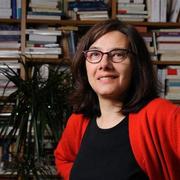
French literary critic Pascale Casanova died on September 29, 2018, at the age of 59. During the past ten years, she has been courageously fighting an incurable disease while publishing two fresh books. Her work represents a major contribution to the field of world literature. Based on her PhD dissertation supervised by Pierre Bourdieu, Casanova’s La République mondiale des lettres (Seuil, 1999) quickly became a classic reference when it was translated into English as The World Republic of Letters(Harvard UP, 2004). Casanova describes the emergence and development of an autonomous international literary field in opposition to the instrumentalization of literature for the construction of national identities. This field is structured by unequal power relations between cultures according to their literary capital that can be measured through the number of works that entered the world literary canon – the oldest and the most established ones; the French, the English, the German, and the Russian culture enjoy a clear advantage. As Casanova argued in an edited volume entitled Des littératures combatives. L’internationale des nationalismes littéraires (Raisons d’agir 2011), literary nationalism has also been a way for dominated literatures to fight domination on the international literary field.
All Casanova’s works deal with the question of linguistic domination. In her admirable monographs on Beckett (Beckett, l’abstracteur, Seuil, 1997; Engl. transl. Samuel Beckett: Anatomy of a Literary Revolution, Verso, 2006) and on Kafka (Kafka en colère, Seuil, 2011; Engl. transl. Kafka, Angry Poet, Seagull,2015), she relates the symbolic revolutions they achieved to their belonging to a "minor literature" in Deleuze and Guattari's sense. For instance, she interprets Kafka’s novels as a euphemized critique of the symbolic violence underlying the assimilationist desire of the Jewish community. Her last book, La Langue mondiale. Traduction et domination (Seuil, 2015) analyzes the role of translation as a weapon against linguistic domination and as a mode of accumulating symbolic capital, starting with the example of the translations from Latin into French in the 16th and 17thcenturies and closing with a discussion on the growing domination of English and its implications.
Before dedicating herself entirely to research, Pascale Casanova was one of the most important French literary critics active in the media. She worked as a producer for radio station France-Culture. In her program « Les Jeudis littéraires », followed by « l’Atelier littéraire », she introduced, with her beautiful deep voice, all the most innovative French and foreign authors. Despite the fact that she did not get an academic position in France after her PhD, she persevered in a quite disinterested manner in producing a very original and inspiring body of research. She taught in the United States at Duke University, where she was invited for a three-year visiting professorship. I remember her telling me how much she enjoyed teaching there, and how patient and nice the students were with her, while her illness affected her movement and speech.
Apart from her research, Pascale Casanova was deeply committed to defending the autonomy of intellectual life. She was a major contributor to the international magazine Liberlaunched by Pierre Bourdieu in 1988, and one of the editors of the small publishing house he founded in 1996, Raisons d’agir. We already miss her voice and the works she had yet to give us.
--Gisèle Sapiro
Pascale Casanova has had an immense and lasting impact on world literary studies. She was among the first scholars we invited to teach for IWL when it was first founded, and she had planned to do so in Istanbul before her encroaching illness rendered this unfeasible. Even amid her struggles with her health, her intellectual vigor and acuity were undiminished, as can be seen in her last book, La Langue mondiale, an incisive discussion of her own language as at once a dominating force and a means for writers to resist that very domination.
To honor Pascale’s memory and to further the ongoing assessment of her work, we are planning a plenary session at our upcoming IWL session at Harvard next July, devoted to her scholarship and impact. This will be followed by a special issue of the Journal of World Literaturein 2020, which will be co-edited by Gisèle Sapiro and Delia Ungureanu. We invite submissions for this special issue; inquiries can be addressed to Delia Ungureanu at deliaungureanu@fas.harvard.edu.
– David Damrosch
"Casanova' s World Republic of Letters is a unique book!"
-- Orhan Pamuk
What I will always remember, about Pascale Casanova, is her uncompromising seriousness. We had just met, in a house full of people, and she immediately sat down on the steps, and started talking about literature. Trays with wine glasses, food, people – nothing. We had things to talk about, why waste time.
It was a strange encounter, ours. A couple of years earlier, we had independently and simultaneously advanced the same thesis about the dynamics of world literature: she in a major scholarly volume in French, I in a short polemical essay in English. And so, although there were plenty of things we disagreed upon, the dominant feeling between us remained always an adolescent delight in having found an unexpected accomplice.
We both needed one. Time after time (beginning with the seminar that followed that initial encounter) we were attacked for our, god forbid, Eurocentrism. Especially in her case, the attack was nonsense. Fortunately, she remained undeterred, and unafraid. This is how she should be remembered: intelligent, alone, brave. And with a gleam of laughter in her eyes.
-- Franco Moretti
